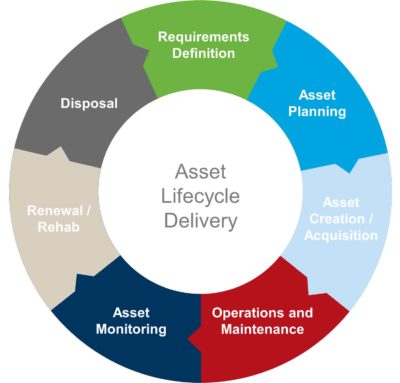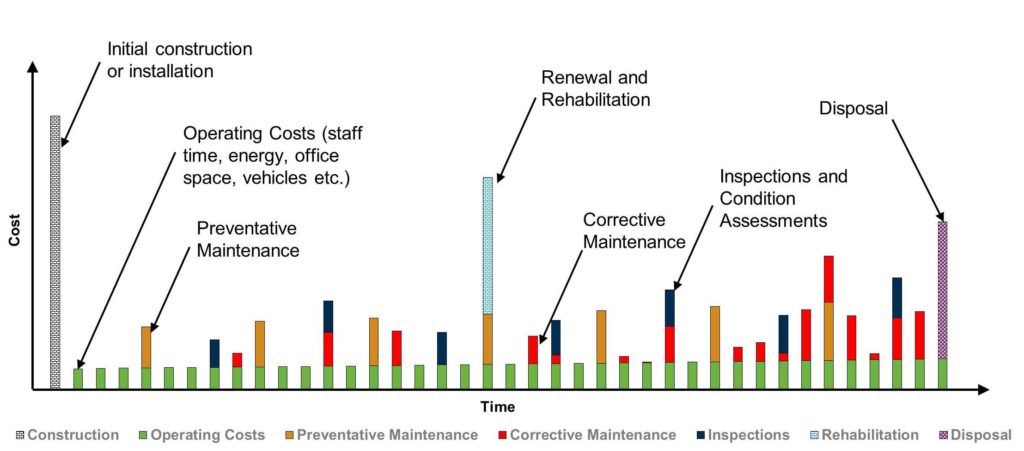On this page
Asset management helps protect and enhance the quality of life in Guelph by making the best possible decisions about our assets—pipes, buildings, roads and parks—in a way that provides targeted levels of service and manages risk in a cost-effective manner.
 Good asset management means making decisions based on the lowest long-term cost over the entire lifecycle of the asset, rather than short-term savings, and managing assets in a way that balances service levels, risk and cost.
Good asset management means making decisions based on the lowest long-term cost over the entire lifecycle of the asset, rather than short-term savings, and managing assets in a way that balances service levels, risk and cost.
An asset’s lifecycle begins when a need is identified. From there the asset is planned, created or acquired, operated and maintained, monitored, and replaced or upgraded when it reaches the end of its life.
Guelph’s asset management plan gives us a clear, detailed picture of our assets, needs and priorities. This plan is our roadmap to getting the best value and addressing the highest-priority needs with your tax and rate dollars. Asset management is how we plan for and prioritize our infrastructure needs to achieve the greatest benefit to our community.
Why is asset management important?
Asset management:
- Helps protect and enhance the quality of life in Guelph by ensuring the best possible decisions regarding our assets.
- Supports evidence-based business cases for budgets and long-term financial forecasts.
- Drives longer term thinking and planning.
- Supports financial sustainability.
Asset management planning is a requirement for many Provincial and Federal grant programs including the Federal Gas Tax program, which the City receives funds from every year. The Province of Ontario may also make asset management planning and/or policies a requirement under the Jobs and Prosperity Act, 2014. Having an asset management program puts Guelph in a progressive position for future grant opportunities and changes to legislation.
Defining asset management
The discipline of asset management is a combination of management, financial, economic, engineering, operations and other practices applied to assets with the objective of providing the required level of service and minimizing risks in the most cost effective manner. The key principles of asset management are:
- Providing defined levels of service and monitoring performance;
- Managing the impact of growth through demand management and infrastructure investment;
- Taking a lifecycle approach to developing cost-effective management strategies for the long-term to meet that defined level of service;
- Identifying, assessing and appropriately controlling risks; and
- Having a long-term financial plan which identifies the expenditures and how it will be funded.
Asset management goals
![]() Providing levels of service that meet expectations and ensure a high quality of life for the community through:
Providing levels of service that meet expectations and ensure a high quality of life for the community through:
- Defining levels of service in consultation with stakeholders;
- Evaluating and communicating the cost of providing the service; and
- Quantifying the impacts of decisions on service.
![]() Managing risks through:
Managing risks through:
- Understanding risk exposure;
- Establishing the organization’s risk appetite;
- Developing risk management strategies; and
- Implementing appropriate condition assessment, inspection, and performance evaluation strategies for all relevant assets.
![]() Demonstrating sustainable, full lifecycle planning through:
Demonstrating sustainable, full lifecycle planning through:
- Quantifying and tracking the full lifecycle costs for assets;
- Ensuring budgets are supported by asset management practices; and
- Bridging the gap between capital and operational budgets.
![]() Ensuring accountability, transparency and engagement through:
Ensuring accountability, transparency and engagement through:
- Documenting asset management business processes;
- Publicizing asset management documents such that they are accessible to all stakeholders; and
 Developing stakeholder engagement strategies to ensure that internal and external stakeholders are able to participate, influence, and contribute to asset management initiatives.
Developing stakeholder engagement strategies to ensure that internal and external stakeholders are able to participate, influence, and contribute to asset management initiatives.
Asset lifecycle activities and costs
Assets cost more than the price to build them. Capital costs—construction, rehabilitation and disposal—only make up about 20 per cent of an asset’s full lifecycle cost. The highest influence on the cost is early in the lifecycle.
Definitions
Speaking the same language
Here are some common terms used when talking about asset management.
- Asset
- An item, thing or entity that has potential or actual value to an organization.
- Asset management
- Coordinated activity of an organization to realize value from assets.
- Asset management plan
- Documented information that specifies the activities, resources, and timescales required for an individual asset, or a grouping of assets, to achieve the organization’s asset management objectives.
- Asset management system
- The people, processes, tools and other resources involved in the delivery of asset management.
- Asset system
- Set of assets that interact or are interrelated.
- Corporate asset management
- The application of asset management principles at a corporate level to maximize consistency among diverse asset groups. Corporate asset management creates efficiency by harmonizing service levels and business processes wherever possible.
- Lifecycle
- Stages involved in the management of an asset.
- Level of service
- Parameters or a combination of parameters, which reflect social, political, environmental and economic outcomes that the organization delivers.
- Risk
- A combination of the likelihood and consequence of an unforeseen event occurring.
Documents
City of Guelph Asset Management Plan for Core Municipal Infrastructure, 2021
2020 Corporate Asset Management Plan
Guelph Natural Asset Inventory – Consolidated Report
Hanlon Creek Stormwater Valuation
Guelph’s Asset Management Policy sets out our commitments and expectations for decisions, activities and behaviour concerning asset management.
Guelph’s 2017 Corporate Asset Management Plan is the first asset management plan developed and published by the City. This plan outlines processes and practices that are in place to ensure the delivery of the City’s services over the next 10 years.
Council reports and presentations
July 5, 2016: IDE Committee report, Corporate Asset Management goals and work plan, page 99
January 23, 2017: Council presentation, Corporate Asset Management
March 6, 2017: Council report, Corporate Asset Management Plan and Policy, page 72
May 7, 2018: Council report: Asset management program progress and policy update

